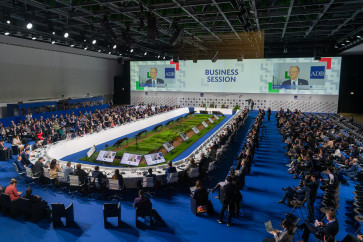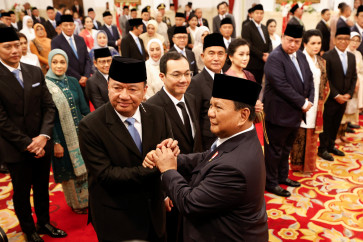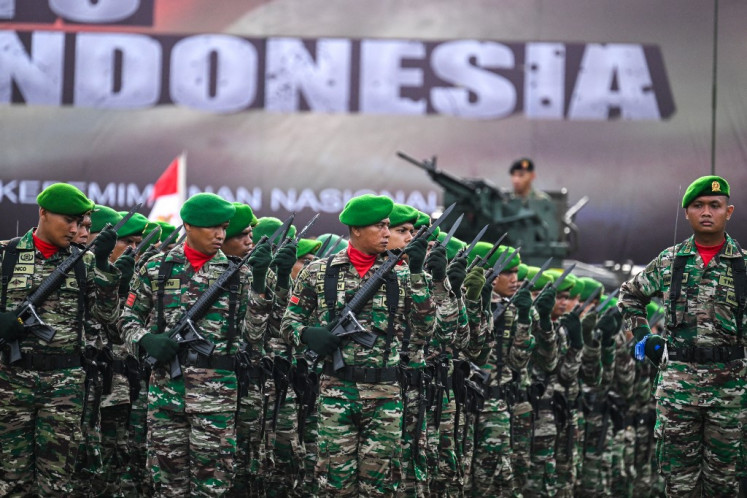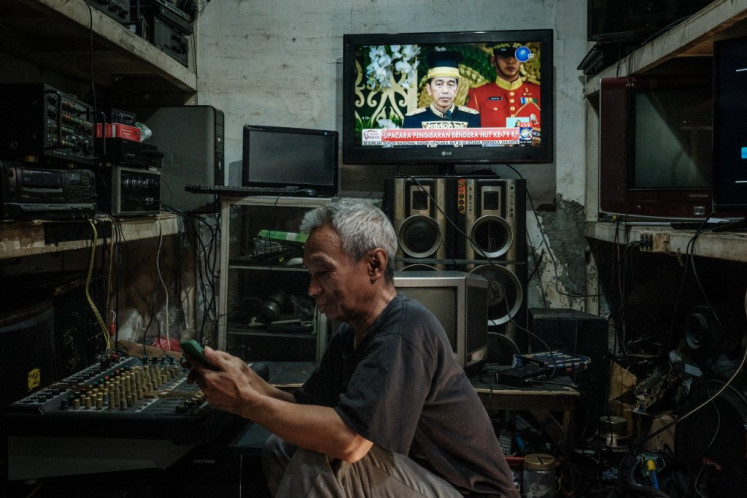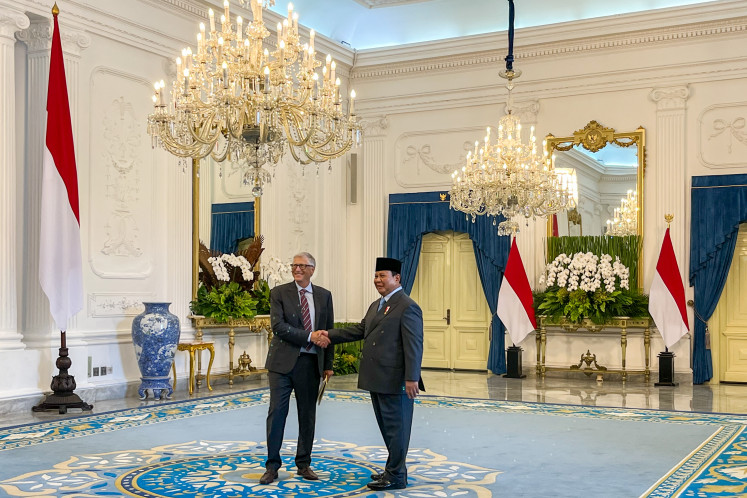Election showdown expected in Malaysia
Tight contest: A couple rides a motorcycle past the flags of Malaysia’s ruling coalition, Barisan Nasional (National Alliance), and opposition coalition Pakatan Harapan (Alliance of Hope) ahead of the upcoming 14th general election, on Langkawi Island on Friday
Change text size
Gift Premium Articles
to Anyone

T
ight contest: A couple rides a motorcycle past the flags of Malaysia’s ruling coalition, Barisan Nasional (National Alliance), and opposition coalition Pakatan Harapan (Alliance of Hope) ahead of the upcoming 14th general election, on Langkawi Island on Friday. Former prime minister Mahathir Mohamad is contesting a parliamentary seat in Langkawi. (Reuters/Lai Seng Sin)
Malaysia is heading toward General Election 14 (GE14) on May 9, with the opposition breaking away, forming two separate coalitions against the solid Barisan Nasional (National Alliance) that rules the country. The split and the return of a former prime minister onto the political stage is believed to be a turning point. The Jakarta Post’s Novan Iman Santosa visited Malaysia recently to get a picture of the political dynamics in the negara serumpun.
Candidates for the general election are scheduled to register their nominations with the Malaysian Election Commission (SPR) on Saturday morning, ahead of the showdown on May 9.
Prime Minister Najib Razak, leader of the governing Barisan Nasional (National Alliance) coalition, is expected to defend his seat in Pekan, Pahang, under the banner of his own party, The United Malays National Organization (UMNO).
Najib is working hard to retain the mandate, so that UMNO can rule for another five years, continuing its leadership ever since Malaysia’s independence back in 1957.
UMNO information chief Annuar Musa told The Jakarta Post that the party, and other Barisan Nasional (BN) components, were upbeat they would maintain their mandate.
He said UMNO had been taking part in elections and running the government for a very long time.
“The Barisan Nasional relies on its track record and actual performance. There is no magic,” he told the Post at the Parliament.
“As long as we serve the people well, perform and fulfill the mandate given to us by the people, we will be reelected.”
Annuar said BN’s main concern was not so much preparing for the election but to make sure the government had a good track record and delivered on the promises made in the previous election, while at the same time handling all the problems that needed to be resolved.
“For example, there are things that we never predicted, let say the economic turmoil; those things have to be handled properly by a good government,” he added.
In Malaysia’s political system, the general election is a competition of individuals. The candidates register themselves with the SPR, but they are allowed to represent a party and use its logo with the party’s written consent.
The election uses the first-past-the-post voting system, and the popular vote does not necessarily grant victory, as was the case in GE13, when the BN lost the popular vote but still won the greatest number of seats.
Najib ended speculation about when the general election would take place when, after consulting Malaysian King Sultan Muhammad V, he announced the dissolution of Parliament on April 6, effective on April 7.
The weekend of April 6 and April 7 had been widely expected as the dissolution date to allow for the election to take place before the start of Ramadhan in mid-May.
Malaysian law requires that an election be held 60 days after the Parliament is dissolved. The dissolved Parliament had started its term on June 24, 2013.

The SPR announced on April 10 that the election would take place on May 9, marking the first time for it to take place on a weekday instead of a weekend.
The following day, the Malaysian government announced that May 9 would be declared a public holiday to allow the people to go to the polling stations.
The general election for the 14th Parliament is expected to be a tight one, considering the latest political dynamics in Malaysia.
One of the biggest surprises was former prime minister Mahathir Mohamad’s announcement in January to run for the premiership at the advanced age of 92. Once the leader of the UMNO, Mahathir established his own party, the Malaysian United Indigenous Party (PPBM), in September 2016 to express his disappointment with the UMNO and to topple Najib.
Mahathir was a strong leader, hated and dreaded by the opposition during his tenure as prime minister for 22 years, so his decision to come back was shocking enough. As if that was not enough, Mahathir decided to run as a chairman for the opposition’s Pakatan Harapan (Alliance of Hope) and run for a seat in Langkawi Island under the banner of the PPBM.
“When I resigned and was replaced by Abdullah Badawi and Najib Razak, many groups came to me, because they were dissatisfied with the government, especially Najib’s, and asked me to do something about it,” the told the Post at his office in Putrajaya.
“So, I tried to talk to Najib and counsel him, to no avail. So, many people asked me to do more, so I resigned from the UMNO.
“I then found out that it was impossible for any party to topple the BN, because the BN is so strong.”
Mahathir said the only way to topple the BN was if all opposition parties joined hands and worked together in a coalition.
“That’s why I established a new party, the PPBM. This party is special, unlike other parties that are multiracial parties, the party is a pribumi [indigenous] Malay party, which will become a challenge to the UMNO,” he said.
“If the new party was multiracial, UMNO people would not support it.”
The former prime minister said many of PPBM’s founders were former leaders and members of the UMNO.
The PPBM works together with three other parties to avoid a clash among the opposition parties.
“That’s why we established Pakatan Harapan, and they all asked me to become the coalition’s chairman and suggested I become their prime minister candidate,” said Mahathir.
“So, it is not because I want to become a prime minister again, but they believe that if I lead the coalition, it may attract Malay voters that previously voted for the UMNO.”
Established in September 2015, Pakatan’s leader is Wan Azizah Wan Ismail, president of the People’s Justice Party (PKR) and the wife of its jailed founder, Anwar Ibrahim, Mahathir’s former protégé-turned-adversary.
The opposition chemistry is getting more complex, as Pakatan includes the multiracial, Chinese-dominated Democratic Action Party (DAP), with the leaders of which Mahathir traded barbed comments during his premiership.
The fourth party in Pakatan is the National Trust Party (Amanah), a splinter group of the Pan-Malaysian Islamic Party (PAS), which left Pakatan Harapan’s predecessor, Pakatan Rakyat (People’s Alliance) in June 2015.
An original member of Pakatan Rakyat, together with the PKR and the DAP, the PAS left the coalition following an ideological dispute with the DAP. An internal rift also took place inside the PAS, with the purge of progressive members who then established Amanah and chose to remain with Pakatan.
The PAS has made it clear that it will be a kingmaker, as there would be no majority in the three-way race and everyone would need the PAS’ seats to form a government, PAS president Abdul Hadi Awang told the Post recently.
After the departure, the PAS created its own coalition, the Gagasan Sejahtera (Prosperous Idea) with two other Islam-based parties, the Malaysia National Alliance Party (Ikatan) and the Pan-Malaysian Islamic Front (Berjasa). The coalition, however, also includes the multiracial Love Malaysia Party (PCM).
Many observers believed that PAS would tend to join the governing BN, of which the UMNO is a senior component. The PAS had joined the ruling coalition as a minor partner from 1972-1978.
“The PAS had 21 seats at the 13th Parliament, and we are upbeat that we can maintain this number,” Hadi told the Post at PAS headquarters in Kuala Lumpur.
He added that the PAS planned to grab another 16 seats from PKR’s 30 seats to make the party a force to reckon with, as no coalitions would be able to attain the majority of 222 seats at the Dewan Rakyat, the Parliament’s lower house.
While Gagasan is dominated by Islamist parties, Hadi maintained that the coalition would not alienate non-Muslims, as shown by the presence of a multiracial component, the PCM.


